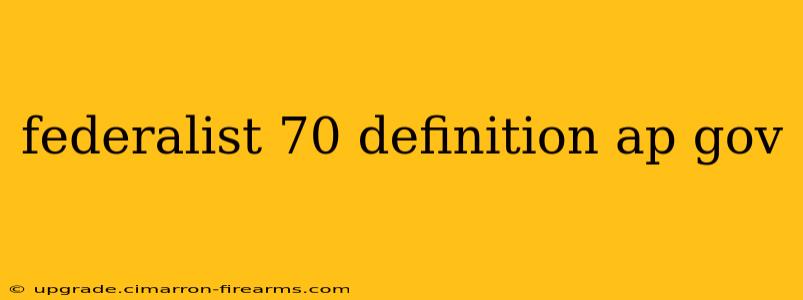Federalist No. 70, penned by Alexander Hamilton, is a crucial essay in the Federalist Papers, a series of 85 articles advocating for the ratification of the United States Constitution. This particular essay focuses on the importance of a strong, energetic executive branch within the newly proposed government. For AP Government students, understanding Federalist No. 70 is essential for comprehending the framers' vision for the presidency and its role in maintaining a stable and effective republic.
Key Arguments of Federalist No. 70
Hamilton's central argument revolves around the need for a unified executive, as opposed to a plural executive (multiple individuals sharing executive power). He meticulously lays out several reasons for this preference, all contributing to the overall theme of efficient and effective governance:
1. Energy in the Executive: The Core Argument
Hamilton argues that a singular executive branch possesses inherent "energy." This "energy" isn't simply about physical vigor, but rather encompasses several critical qualities:
- Unity: A single executive ensures decisiveness and accountability. With multiple executives, disagreements and delays are inevitable, hindering swift action in times of crisis. This unity simplifies decision-making, preventing gridlock.
- Dispatch: A sole executive can act quickly and efficiently. Without the need for consensus-building among multiple individuals, the executive can respond promptly to emergencies or pressing national issues.
- Responsibility: With a single person at the helm, it's easier to identify and hold accountable the individual responsible for governmental actions or failures. This enhances transparency and public trust.
- Secrecy: In matters of national security or diplomacy, a single executive can maintain confidentiality more effectively than a group. This is vital for protecting sensitive information and negotiating effectively with other nations.
2. Countering the Dangers of a Weak Executive
Hamilton also addresses the potential dangers of a weak or inefficient executive branch. He points to historical examples of weak executives leading to instability and governmental paralysis, underscoring the potential for chaos and vulnerability if executive power is diluted. A powerful executive, according to Hamilton, acts as a safeguard against these very threats.
3. The Importance of Executive Power
Hamilton didn't advocate for an all-powerful, unchecked executive. He understood the need for checks and balances. However, he emphasized that the executive must possess sufficient power to fulfill its constitutional duties effectively. This includes the power to:
- Enforce laws: The president's role as chief executive ensures the proper implementation of laws passed by Congress.
- Command the military: In times of war or national emergency, a strong military commander-in-chief is vital for national security.
- Conduct foreign policy: The president's role in international relations requires decisive leadership and the ability to negotiate effectively with other countries.
Implications for AP Government
Understanding Federalist No. 70 is vital for AP Government students for several reasons:
- Understanding the Presidency: The essay provides crucial insights into the framers' intentions regarding the structure and powers of the presidency.
- Analyzing Executive Power: Students can use Federalist No. 70 as a framework for analyzing the evolution of presidential power and its impact on American politics.
- Debating Constitutional Issues: The essay provides a foundation for discussing contemporary debates about the balance of power between the executive and other branches of government.
- Exam Preparation: Federalist No. 70 is frequently featured on AP Government exams, making a thorough understanding of its arguments essential for success.
In conclusion, Federalist No. 70 provides a compelling argument for a strong, unified executive branch. It's a fundamental text for understanding the structure and function of the American presidency and its enduring relevance to contemporary political debates. For AP Government students, mastering its key arguments is essential for a comprehensive understanding of the U.S. political system.

